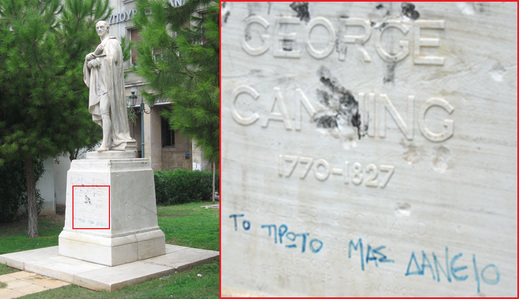The Greek Revolution against the Ottoman empire, started in 1821. In the beginning, it didn't look like a large scale revolution at all, as it was mostly taking place at a small part of Peloponnissos, in southern Greece, and it didn't worry the Ottomans. The Greeks had unimportant military power and no support from abroad, in terms of diplomacy, finances or weapons. Only when, later on, the British and the French decided to offer this support to the Greeks, it seemed likely that the revolution would be successful and that a new Greek state would be founded.
Until then though, the 3 european Great Powers (British Empire, France, Russia) don't seem to care about the revolution. But in 1823, George Canning, who was then the Foreign Secretary of the British Empire takes a sudden turn and recognizes Greece as a sovereign country. We don't know if Canning liked the greek people, but we know that he saw greeks as a good chance for Britain to step in the eastern Mediterranean – against the Ottoman naval monopoly in the area. You see, at that time the Brits had to ask for the Ottomans' permission to get their cargo back and forth to India.
Right after the recognition of the Greek state by the British Empire, Canning offers the greeks 2 loans to “help” the revolution. The first loan was given on November 1823. The greeks took 472.000 british pounds and the overall interest was 69%. The second loan was given on 1825, and was 1.032.000 british pounds, with an overall interest of 93%. One would say that Canning probably didn't like the greeks...
Whatsmore, at this point, there is yet no real greek government, but rather a bunch of non-elected rich greeks (ship owners etc.) who have decided to represent the greek people in Europe.
So the actual money Greece got was 1,5m pounds. But still, only 0,5m pounds made it to the country's treasury. The rest was shared among the negotiators of the loan, the british bankers, the greek ship owners and to other “hidden costs”. These 2 loans were called the “Loans of Independence” - a phrase that is a paradox by itself.
The most well known example of the splurging that took place is the wages of Lord Cochrane who served as a Rear Admiral in the Greek Navy (he also served in the navies of Chile and Brazil, during their own wars of “independence”). His yearly wage was 57.500 pounds which according to the historian Dertilis was equal to a 50-years income for a middle class family at that time”.
I don't know if it matters to anyone, but except for countries that once belonged to the British Empire (Australia, Canada etc.) the only places on earth named after Canning are this square in central Athens, a street in Buenos Aires, Argentina (which was renamed lately) and a street in Rio de Janeiro, Brazil. This is an interesting coincidence, since all 3 countries have gone through IMF programs in the last decade.
Back to today, when another story of independence unfolds before our eyes: The chairman of Eurogroup (that is the meeting of the finance ministers of the Eurozone) Jean Claude Juncker, stated that both the German and French governments knew about the greek debt crisis but did nothing to stop it, and that they intentionally left Greece to get where it stands now.
It was of their interest to keep quiet, because Greece had money to spend, even if it wasn't its own money, especially to buy weapons from them. (take a look at Turkey's PM statement on the subject)
It was of their interest to let Greece get a step before bankruptcy, so they can now buy Greece's state enterprises cheap.
The exact statement of Juncker: (copying from the French Press Agency, AFP)
Eurogroup chief Jean-Claude Juncker said Friday that Greece's financial woes were well known among top EU officials but kept quiet until the crisis erupted last year. "It was quite obvious that one day Greece would have to face this kind of problem, and we knew that this problem would occur," Juncker told a forum on the sidelines of the International Monetary Fund and World Bank meetings in Washington. Juncker said German and French officials along with European Central Bank chief Jean-Claude Trichet had for some time been discussing "the perspectives of what was not at that time known as so-called Greek crisis." "I could not go public with the knowledge that I had," he added. "The Greek crisis could have been avoided, but not starting last year, starting two or three decades ago," the European finance ministers chief said. Juncker said he tried at one point to seek a solution to the problems with an unnamed Greek prime minister who told him: "I am governing a country of corruption."
Now remains the question, “whose fault is what happened to Greece?”
Of course it's a matter of how a country manages its finances, and Greece certainly doesn't deserve a prize there. But on the other hand, which country would have made it, if by the moment of its creation is obliged to pay back loans of interests up to 90%? One would say, “then why did they get the loans?” If they hadn't got them, the revolution wouldn't succeed and no Greek state would ever exist, which is fine with me.
After all, it doesn't matter whose fault it is. It matters who pays for it.

 RSS Feed
RSS Feed